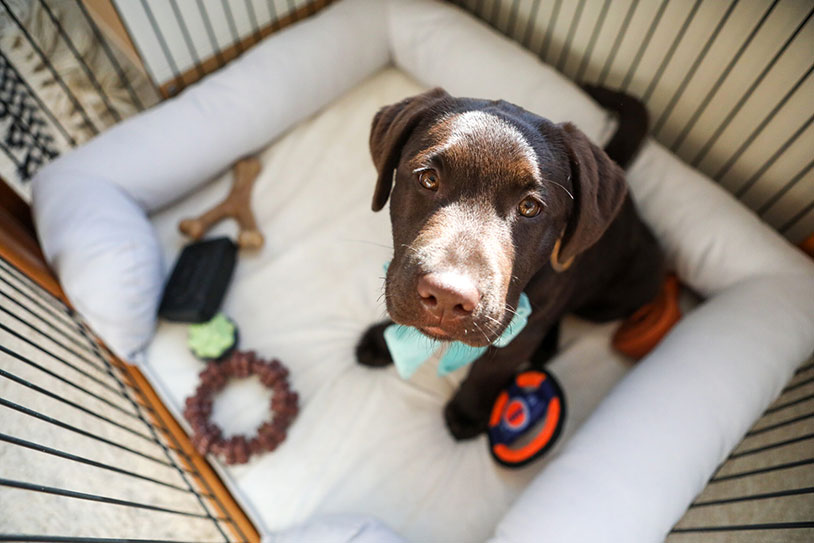Canine Health : Life Stages/Needs

A Guide to Crate Training Your Eight-Week-Old Puppy
Did you add a four-legged friend to your family during the holidays? Congratulations! Bringing home an adorable puppy is an exciting time!
January is National Dog Training Month, and the perfect opportunity to begin house training. Crate training can be part of this process, providing your pup with a safe space to sleep and preventing accidents in the house. Crating also eases the stress of travel and vet visits. Let’s dive into how you can create a successful crate training schedule for an 8-week-old puppy at night and during the day.
Why Crate Train Your Puppy?
Puppies are naturally curious and can get into mischief when unsupervised, so crating provides a secure, controlled environment. Moreover, dogs instinctively avoid soiling the place they sleep, making crate training a helpful tool for housebreaking your pup.
It’s important to remember that young puppies, especially eight-week-old ones, cannot hold their bladder for long stretches of time. The general rule of thumb for a puppy is that they can be crated for their age in months, plus one hour.
For example, an eight-week-old puppy (about two months) can hold their bladder for around three hours. At night, or for longer periods, give your puppy access to their crate within a safe, gated area with newspaper or puppy pads nearby. This way, they can sleep in their crate but still relieve themselves outside it when needed.
Introducing the Crate
To start, set up the crate in a familiar area like the living room or kitchen. Place your puppy’s blanket and favorite toy inside to make it comfortable. Let your puppy approach at their own pace, allowing them to sniff and explore. Encourage them with an excited tone and a few scattered treats in and around the crate. This way they’ll associate it as a positive, safe space.
Feeding in the Crate
You need to be patient in establishing a successful crate training schedule for your 8-week-old puppy at night and during the day
- Begin feeding meals near their crate to continue building a positive association.
- Start by placing their food bowl just outside the crate, then gradually move it closer to the back of the crate over time.
- Once they’re comfortable eating in the crate, close the door while they eat, but let them out immediately after the meal. Remember to praise them.
- Gradually increase the time they stay inside after eating.
- If your puppy whines or barks, avoid letting them out until they’re quiet to prevent reinforcing this behavior.
House Training with the Crate
When your puppy is comfortable eating in their crate, begin extending their crate time with you nearby. Ask them to enter their crate using a consistent crate command such as “Kennel up” or “Go to your crate.” Reward them with a treat each time they obey.
Gradually increase the amount of time they spend in the crate while you’re out of sight.
Once they can stay calm in their crate for 30 minutes, you can leave them in for longer periods or even let them sleep in the crate at night. If you do decide to leave them overnight, you’ll need to take them out frequently for relief, especially if they’re still adjusting to nighttime crate training. Puppies at eight weeks old have small bladders and need to go out more often than older dogs, so be patient and attentive.
What to Do at Night
Nighttime crate training is an important part of your puppy’s house training routine. Here’s how to start a crate training schedule for an 8-week-old puppy at night.
- Before bedtime: Take your puppy outside to relieve themselves right before they go in their crate. Make sure they’ve had a good amount of play time, so they’re tired.
- Bedtime: Encourage your puppy to settle down in the crate with their blanket and a toy. Close the crate door and turn off the lights but stay nearby for reassurance. Some puppies may whine initially. Avoid releasing them unless you’re sure they need a bathroom break.
- Middle of the night: At eight weeks, your puppy will likely need a potty break in the middle of the night. Set an alarm for about three hours after bedtime, take them out to relieve themselves, and then send them back to their crate without fuss.
- Early morning: Puppies often wake up early, so expect to take them outside as soon as they wake up. Consistency will help speed up house training.
While creating a crate training schedule for an eight-week-old puppy at night, expect the occasional accident. Your puppy is still learning, so frequent trips outside at night will help them understand where they should go to relieve themselves.
Crate Training Tips
- Consistency: Stick to a regular feeding, relief, and crate schedule. This will help your puppy adapt to their crate faster.
- Safety: Don’t use the crate as punishment. It should always be a safe space with positive associations.
- Patience: Every puppy is different. Some adapt quickly to crate training, while others may need more time. Stay calm and patient, especially during nighttime crate training.
- Understanding: If your puppy whines in the crate, make sure it’s not because they want attention. Don’t give in as this reinforces the behavior.
Creating a crate training schedule for an eight-week-old puppy at night and during the day requires consistency, patience, and understanding of your puppy’s needs. By establishing a routine, introducing the crate gradually, and offering positive reinforcement, your puppy will learn that their crate is a safe and comfortable space.
Getting your puppy off to a good start goes hand in hand with ensuring they receive the right nutrition. Black Gold Explorer Puppy Recipe is formulated to meet the nutritional needs of your new puppy and help them grow strong and healthy for the adventures ahead. Learn more here.



